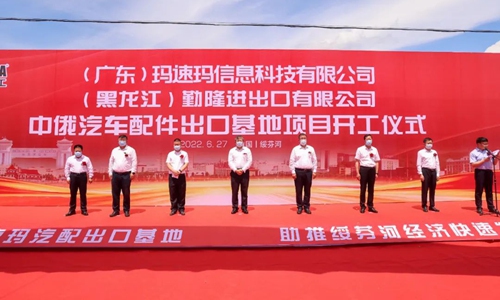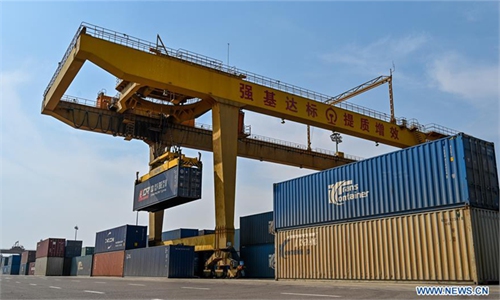Chinese brands see rapid growth in Russia, with popularity on the rise long before sanctions

Consumers walk inside a department store in Moscow, Russia on July 4, 2022. Photo: Xinhua
Many Chinese products, particularly value-added consumer goods, such as mobile phones, cars and printers have seen rapid growth in the Russian market, as local consumers switch to what they consider reliable and affordable products amid escalating tension between Russia and the West.
While some foreign media outlets have been hyping gains of Chinese companies in the Russian market as direct result of Western sanctions, Russian consumers and Chinese industry insiders argue that the growing popularity of Chinese products are the result of years of localization efforts, improving quality and affordability, though the sanctions also played a role.
Russia's top electronics retailer M.Video-Eldorado said that "the total share of Chinese brands in the Russian market in terms of smartphone sales is steadily increasing - from 50 percent in the first quarter, to 60 percent in April to more than 70 percent in June," Reuters reported last week.
Though foreign media reports have been focused on the West's sanctions, Russian consumers said that the growing popularity of Chinese products in the country came long before the sanctions.
27-year-old Pasha, based in Moscow, the owner of an Honor 10 smartphone, told the Global Times that the bigger battery capacity and high quality camera are the main reasons he uses the Chinese brand. He also uses some other Chinese-related products, which he praised for their good quality and reasonable price.
Two other Russian consumers also said that they are using Xiaomi, because it's practical and affordable and is one of the leading brands in the market.
In addition to mobile phones, Chinese car brands also witnessed a jump in popularity in Russia, with most US, European and Japanese car companies announcing the suspension of Russian production or halting exports to Russia.
According to a recent survey, 46 percent of respondents said they would buy a Chinese brand car, and 25 percent said they would be willing to consider a Chinese car without a European brand.
"One important reason for the higher consumer acceptance of Chinese brands is because of the advanced model configuration and control technology over the years," Sun Xiaohong, secretary-general of the automobile branch of China Chamber of Commerce for Import and Export of Machinery and Electronic Products (CCCME), told the Global Times on Tuesday.
According to data from Autostat, a Russian auto industry analysis agency, sales of Chinese-branded sedans in Russia increased by about 30 percent from April to May.
Moreover, Western sanctions against Russia have also exposed the shortcomings of the Russian auto supply chain. Russia only produces about 35-37 percent of its auto parts by itself, with imported auto parts making up as much as 62.5-65 percent, data from CCCME shows.
Experts said this also highlights the needs for a complete and reliable supply chain, in which China has advantages. In recent years, Chinese automobiles have performed well in the Russian market, with the popularity of Great Wall, Chery, Geely and other brands continuing to expand, CCCME said.
"Russian car dealers are eager to establish and expand business cooperation these days... there will be more Chinese car brands entering the Russian market to gain market share, including new energy vehicles," Sun said.
Wang Yu, a manager with the Russian Asian Union of Industrialists and Entrepreneurs, told the Global Times that he has received masses of inquiries about orders and cooperation from Russian companies seeking printers, whose supply has tightened due to Western sanctions on spare parts.
"One Russian company wants hundreds of thousands of printers all at once, and we have responded by coordinating with corresponding factories in China," Wang said.
While there is the risk of being targeted by the West, industry insiders are confident that these risks can be minimized via highly self-dependent technology and complete supply chains, advantages that plants in China possess. "Unlike those Western brands, the after-sales service of Chinese brands can also be counted on," Wang said.
While it is a normal market trend for Russian companies and consumers to rely on Chinese products in dealing with the supply chain disruption and lack of stock due to Western sanctions, Chinese companies should further actively adapt to the new market with better product and service quality in a bid to gain public recognition of their brands in the long-run, said Cui Hongjian, director of the Department of European Studies at the China Institute of International Studies, told the Global Times on Tuesday.
Meanwhile, as the late effects of Western sanctions on Russia emerges, including on its exports of technology and products, it cannot be ruled out that with the increasing demand from Russia and more Chinese companies entering the market, the US may further impose long-arm jurisdiction and sanctions on Chinese companies, experts said.
Chinese officials have repeatedly expressed opposition to the US' unilateral sanctions and stated that China will continue to normal trade and economic cooperation with Russia.
Commenting on the recent US move to blacklist five Chinese companies for allegedly supporting Russia's military, Zhao Lijian, a spokesperson for the Chinese Foreign Ministry, said that the US move has no basis in international law, nor is there a mandate of the UN Security Council allowing such moves.
Calling the move as another example of US unilateral sanctions and long-arm jurisdiction, Zhao vowed that "China will take all necessary measures to resolutely protect lawful rights and interests of Chinese companies."


